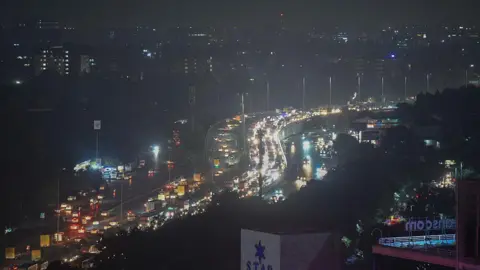In a stirring political clash, allegations of "vote theft" have surfaced in India, leading opposition parties to vehemently accuse the Election Commission of irregularities in the 2024 general elections. This controversy came to a head on Tuesday when Parliament was forced to adjourn following calls from opposition MPs for a debate on the reliability of the electoral process. The sentiments intensified as several leaders, including Rahul Gandhi of the Congress party, faced temporary detainment by police while attempting to rally outside the Election Commission's headquarters in Delhi.
Gandhi first brought these concerns to public attention during a press conference on August 7. He has since united a significant number of opposition lawmakers behind his claims of extensive voter manipulation. In response to the mounting allegations, both the Election Commission and the ruling Bharatiya Janata Party (BJP) have categorically dismissed these accusations.
The Congress leader has outlined claims of systemic mismanagement during the elections, alleging that data sourced from the Election Commission itself points to over 100,000 fraudulent entries on the voter list in Mahadevapura, a constituency in Bangalore. He contends that this manipulation includes duplicate registrations, invalid addresses, and concentrated vote registrations.
Among the cited cases is that of a voter he claims cast her ballot twice, a statement that has been countered by the election body. Gandhi's broader argument states that such discrepancies may have cost the Congress party at least 48 parliamentary seats, asserting that the Election Commission has neglected its duty to uphold the "one man, one vote" principle. Ultimately, the Congress secured only 99 of the 543 seats, compared to BJP's 240.
In response to these allegations, the Election Commission has labeled the claims as groundless, demanding that Gandhi either substantiate his assertions with sworn evidence or retract his statements. BJP members have echoed these sentiments, criticizing the opposition for allegedly undermining democratic institutions.
The unfolding drama is further complicated by the recent revision of electoral rolls in Bihar, as this contentious process has raised questions about who has been disenfranchised in light of allegations from many voters about inaccuracies and missing entries on the draft lists. The Supreme Court of India is presently reviewing multiple petitions challenging the electoral roll changes, aware of the stakes involved in ensuring fair representation as elections approach.
As the political climate escalates, Gandhi has intensified his allegations of vote manipulation, stating the issue is not limited to individual constituencies but is rampant on a national scale. With the general elections looming, the integrity of the electoral process remains a provocative flashpoint in Indian politics.
Gandhi first brought these concerns to public attention during a press conference on August 7. He has since united a significant number of opposition lawmakers behind his claims of extensive voter manipulation. In response to the mounting allegations, both the Election Commission and the ruling Bharatiya Janata Party (BJP) have categorically dismissed these accusations.
The Congress leader has outlined claims of systemic mismanagement during the elections, alleging that data sourced from the Election Commission itself points to over 100,000 fraudulent entries on the voter list in Mahadevapura, a constituency in Bangalore. He contends that this manipulation includes duplicate registrations, invalid addresses, and concentrated vote registrations.
Among the cited cases is that of a voter he claims cast her ballot twice, a statement that has been countered by the election body. Gandhi's broader argument states that such discrepancies may have cost the Congress party at least 48 parliamentary seats, asserting that the Election Commission has neglected its duty to uphold the "one man, one vote" principle. Ultimately, the Congress secured only 99 of the 543 seats, compared to BJP's 240.
In response to these allegations, the Election Commission has labeled the claims as groundless, demanding that Gandhi either substantiate his assertions with sworn evidence or retract his statements. BJP members have echoed these sentiments, criticizing the opposition for allegedly undermining democratic institutions.
The unfolding drama is further complicated by the recent revision of electoral rolls in Bihar, as this contentious process has raised questions about who has been disenfranchised in light of allegations from many voters about inaccuracies and missing entries on the draft lists. The Supreme Court of India is presently reviewing multiple petitions challenging the electoral roll changes, aware of the stakes involved in ensuring fair representation as elections approach.
As the political climate escalates, Gandhi has intensified his allegations of vote manipulation, stating the issue is not limited to individual constituencies but is rampant on a national scale. With the general elections looming, the integrity of the electoral process remains a provocative flashpoint in Indian politics.


















